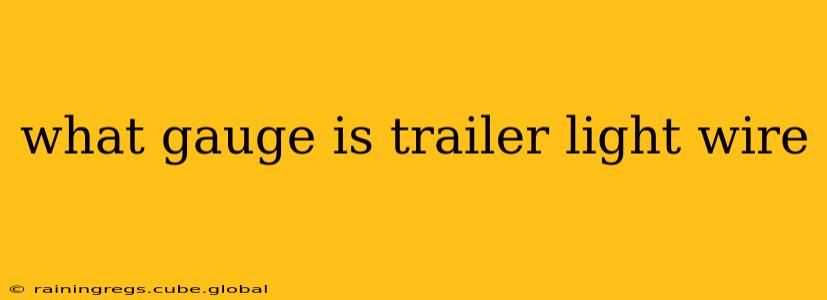What Gauge is Trailer Light Wire? Choosing the Right Gauge for Your Trailer Lights
Choosing the correct gauge of wire for your trailer lights is crucial for safety and reliable operation. Using the wrong gauge can lead to overheating, voltage drops resulting in dim or non-functioning lights, and even fire hazards. This guide will help you understand trailer light wiring and select the appropriate gauge.
The most common gauge of wire used for trailer lights is 12 gauge. However, the ideal gauge can depend on several factors, including the length of the wire run and the number of lights. Let's explore these factors in detail.
What factors influence trailer light wire gauge selection?
Several factors influence the best gauge for your trailer light wiring:
1. Length of the Wire Run: The longer the distance between your vehicle's wiring harness and the trailer lights, the thicker (lower gauge number) the wire needs to be. Longer runs experience more resistance, leading to voltage drop. A thicker wire can handle this resistance better, ensuring your lights receive sufficient power.
2. Number of Lights: More lights mean more current draw. If you have many lights or high-wattage lights (like LED work lights in addition to standard lights), you'll need a thicker wire to handle the increased load.
3. Type of Lights: While LED lights generally draw less power than incandescent bulbs, you should still consider the total amperage draw of all your lights combined. Always check the amperage requirements of your individual lights.
4. Voltage Drop: Voltage drop is the reduction in voltage along the length of a wire due to resistance. Excessive voltage drop leads to dim lights, or lights not working at all. Using a thicker gauge wire minimizes voltage drop.
What gauge wire is recommended for trailer lights?
While 12 gauge is often sufficient for shorter runs and fewer lights, for longer runs or multiple lights, 10 gauge wire is recommended. In some cases, especially with heavy-duty trailers or numerous high-wattage lights, even 8 gauge might be necessary. It's always better to err on the side of caution and use a thicker gauge than you might think you need.
Using a wire gauge chart: Refer to a wire gauge chart that shows the current carrying capacity of different wire gauges at various voltages. This will help you determine the appropriate gauge based on the total amperage draw of your lights.
Is 14 gauge wire suitable for trailer lights?
14 gauge wire is generally not recommended for trailer lights, especially for longer runs or multiple lights. Its smaller diameter makes it more susceptible to voltage drop, potentially leading to unreliable or malfunctioning lights.
What are the consequences of using the wrong gauge wire?
Using too thin of a gauge wire (e.g., 14 gauge or higher) for trailer lights can lead to:
- Dim lights: Insufficient voltage reaches the lights due to voltage drop.
- Intermittent lights: The wire may overheat and cause inconsistent functionality.
- Overheating and fire hazard: Excessive current flow through a too-thin wire can lead to significant heat generation, posing a significant fire risk.
- Blown fuses: The increased current draw could cause your vehicle's fuses to blow.
Choosing the right wire: A summary
To summarize, selecting the correct gauge for your trailer light wiring depends on several critical factors including the length of the wire run, the number and type of lights, and the total amperage draw. While 12-gauge is a common starting point, don't hesitate to opt for a thicker gauge (10 or even 8) for longer runs, multiple lights, or high-wattage fixtures. Always consult a wire gauge chart and prioritize safety when selecting your trailer wiring.
Remember to consult your trailer's wiring diagram and vehicle's owner's manual for specific recommendations. Safety should always be your primary concern when working with electrical systems.
